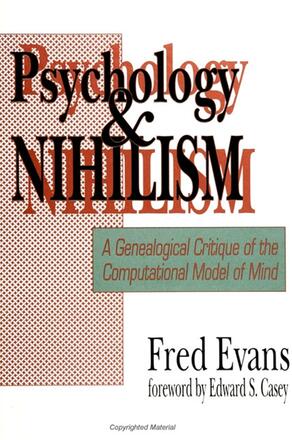
Psychology and Nihilism
A Genealogical Critique of the Computational Model of Mind
Alternative formats available from:
Fred J. Evans is Assistant Professor of Philosophy at Duquesne University.
Reviews
"Evans' most brilliant stroke consists of demonstrating that cognitive psychology must presuppose the very sorts of things which it presumes it can do without, e. g., tacit understanding and an intimate relation to the life-world. Moreover, Evans suggests that a more positive and productive model of psychology can be devised if attention is paid to the idea of a 'transfigurative rationality' which underlies and surpasses the 'technocratic rationality' that is currently dominant in cognitive and other forms of psychology. Nietzsche's notions of the 'the last man' and of 'passive nihilism' are effectively brought to bear in this remarkable book. " — Edward S. Casey, SUNY, Stony Brook
"The author succeeds in showing how cognitive psychology not only unwittingly reflects the currents of nihilism rampant in our time, but also reinforces them with its truncated, technocratic, inadequate conceptions of human minds, human language, human creativity, and human beings.
"The work can help to bring psychology and philosophy into dialogue with each other, breaking down some of the artificial separations that exist between the two fields. It shows the indispensable relevance of philosophical analysis and criticism to theories and claims in psychology.
"The work can help to bring psychology and philosophy into dialogue with each other, breaking down some of the artificial separations that exist between the two fields. It shows the indispensable relevance of philosophical analysis and criticism to theories and claims in psychology.
"The part of the book that I found most illuminating was its explanation of something I have always found to be mystifying—the seeming eagerness of many intellectuals to conceive of ourselves and the universe as nothing more than complex machines. Evans attributes it to the fear of a life without guarantees, a life fraught with ambiguities, uncertainties, diversities, fecund possibilities, and elusive, inexhaustible plays of images—a life that cannot be contained, captured, controlled, or made completely explicable and predictable.